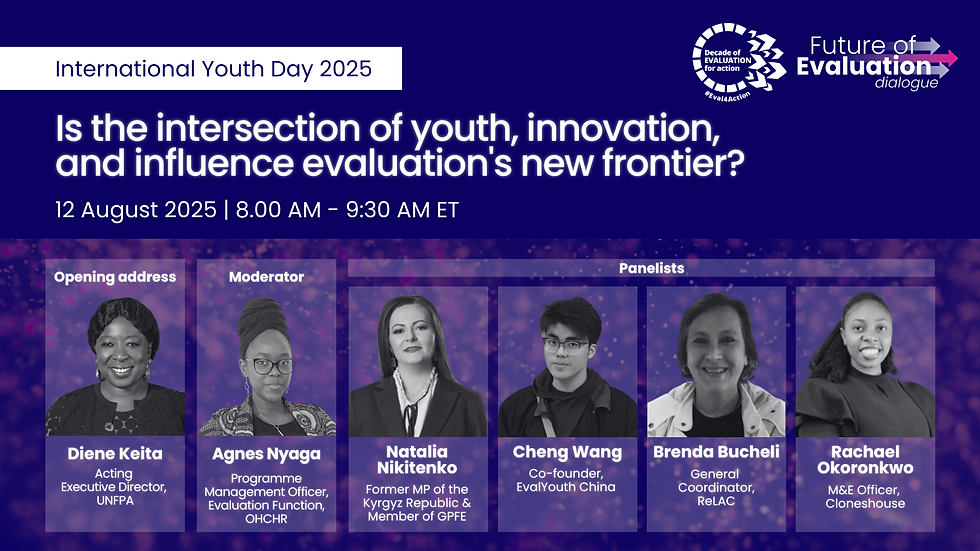7 takeaways: Is the intersection of youth, innovation, and influence evaluation's new frontier?
- Aug 25, 2025
- 4 min read
Updated: Aug 26, 2025
On 12 August 2025, International Youth Day, #Eval4Action hosted the inaugural Future of Evaluation dialogue, titled "Is the intersection of youth, innovation, and influence evaluation's new frontier?". The dialogue featured a powerful opening by Ms. Diene Keita, Acting Executive Director of UNFPA. Ms. Keita, along with Ana Erika Lareza, Chair of the EvalYouth Global Network, passed the #EvalTorch to moderator Agnes Nyaga of OHCHR, symbolically inaugurating the dialogue and lighting the way for a conversation on the future of evaluation.
The dialogue brought together a diverse panel of leaders and experts from different generations and regions, including Natalia Nikitenko (Global Parliamentarians Forum for Evaluation), Brenda Bucheli (ReLAC), Rachael Okoronkwo (Cloneshouse Nigeria), and Cheng Wang (EvalYouth China).

The dialogue confirmed that the intersection of youth, innovation, and influence isn't a future possibility but a present reality for evaluation. The conversation highlighted how young people, as digital natives, are using technology and AI to make evaluation practices more efficient, accessible, and inclusive. The panel also emphasized the crucial role of intergenerational collaboration, in blending the experience of established evaluators with the innovation of youth.
While acknowledging existing challenges like limited resources for youth participation in evaluation and the need to move beyond tokenism, the dialogue affirmed that young people, especially in the Global South, are already using evaluation as a powerful tool for social change and activism. The dialogue concluded with a strong call to action, urging the creation of more opportunities, mentorship programmes, and open spaces for young people to contribute their voices and perspectives, ultimately future-proofing evaluation.
Seven quick takeaways from the dialogue
Evaluation is a tool for transformation, not just a technical exercise. The dialogue emphasized that when young people are meaningfully engaged, evaluation moves beyond a mere technical function. Evaluation was described as a "tool for transformation" that sharpens focus on accelerating progress towards Sustainable Development Goals (SDGs). The discussion highlighted how youth are using evaluation to advance advocacy for institutional strengthening and stronger inclusion.
Youth energy is the catalyst for future-ready evaluation. The participants celebrated International Youth Day by recognizing the energy, creativity, and fresh perspectives that young people bring to the field of evaluation. The conversation stressed that youth energy is essential for evaluation to adapt to the "poly-crisis" and rapid global changes. The discussion framed young people not just as participants but as innovative leaders who are resilient, adaptive, and are committed to the achievement of the SDGs.
Many young people are digitally fluent including in AI and are reshaping evaluation practices. The conversation frequently touched on how digital tools and artificial intelligence (AI) are driving the rapid evolution of evaluation practices. It was noted that young people, as "digital natives," bring technological skills that optimize work processes and give them more relevance in evaluation teams. New technologies were highlighted as a way to dramatically decrease the cost and timeframe of evaluations, making them more accessible and timely.
Intergenerational collaboration is key to bridging the experience gap in evaluation. The dialogue emphasized the importance of collaboration between experienced and young evaluators. The EvalYouth Mentoring Programme was cited as a successful example of this, fostering connections and knowledge transfer between generations. The dialogue stressed the importance of combining the innovative approaches of new technologies with the seasoned interpretations of experienced evaluation professionals. This collaboration is seen as a way to ensure that evaluation grows into a profession where intergenerational dialogue and alliance is the norm.
A broader and interdisciplinary understanding of evaluation is needed to increase its influence. A more expansive and interdisciplinary definition of evaluation allows for more utilization and influence of evaluation practices. Evaluative thinking can be applied in various phases of development initiatives, making it more integrated into professional development. This perspective suggests that evaluation is not an isolated exercise but a continuous process that empowers professionals including youth with skills, applicable to multiple roles.
Youth in the Global South face unique challenges but are pioneering innovative strategies in evaluation. Often young people in the Global South face significant challenges in evaluation such as limited access to reliable data, lack of financial resources and technical skills, as well as complex political and social environments. Given these limitations, there are several examples of young people in the Global South, demonstrating resilience and innovation when conducting evaluations. For example, using mobile technology and social media for data collection and dissemination, forming grassroots networks to drive accountability, among others.
The future of evaluation requires a systemic approach to youth engagement. While the dialogue was optimistic, the conversation acknowledged that meaningful youth engagement is a work in progress. Young people often assume more operational roles in evaluation, such as data collection, rather than strategic roles in decision-making. To overcome this, systemic changes are needed. It is also important to advocate for policies that promote educational opportunities in evaluation for youth, and stronger partnerships between youth movements and local evaluation actors. These actions will help ensure that youth are not just included for "tokenism" but are genuinely empowered to lead and shape the future of evaluation.
About the #Eval4Action Future of Evaluation dialogues
The Eval4Action Future of Evaluation dialogues are a series of forward-looking discussions that explore innovative and adaptive approaches to evaluation. Designed to make evaluation more influential in a rapidly changing and complex world, these dialogues bring together a diverse range of voices—from experts to young evaluators—to share knowledge and highlight ways to future-proof the field of evaluation. Each monthly dialogue is aligned with an international action day, ensuring the conversations are timely and relevant to a global discourse.
The next dialogue, “How can evaluation be a force for peace and resilience building amidst global instability?” will take place on 23 September 2025. Learn more
This article was written with AI support with human authors in the lead.



Comments